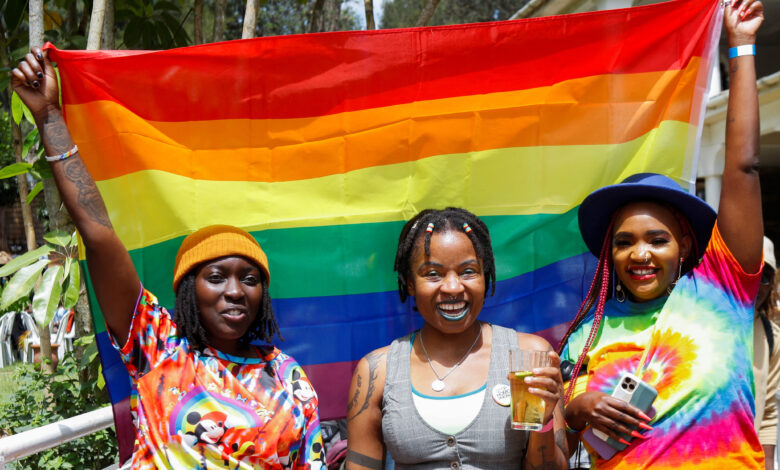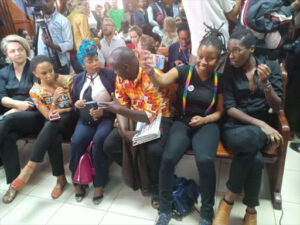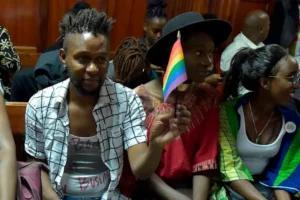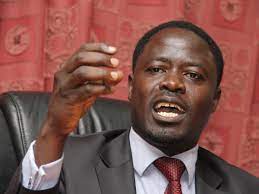Being Gay in Kenya. Karen’s Long Journey to Self-Acceptance and Coming Out as a Lesbian
Kenya, like many countries in Africa remains very conservative, traditional religious and cultural attitudes and values remain strong, and homosexuality remains stigmatized and misunderstood

Many are the days when Karen lived a life of hopelessness and desolation. She went to bed each night uncertain about what the next day would bring. Karen’s story exemplifies the struggles and the dilemma faced by LGBTQ (lesbian, gay, bisexual, transgender, and queer) individuals before coming out. Today, Karen lives her life openly as a lesbian, and on July 23, she turned 24 years old. This date also marks the anniversary of when she first came out to her family.
As we journey down a dusty road leading to her parents’ four-bedroom bungalow in a sparsely populated gated community inside Rongai town in Kajiado County, situated 20 kilometers south of Nairobi and west of the Ngong Hills, we are welcomed into a well-maintained compound, adorned with neatly trimmed lawns that reflect her parents’ status and discerning taste.

“July holds immense significance for me. It not only marks my birth month but also symbolizes the month I made the courageous decision to embrace my true identity,” Karen says with her voice faltering as we settle into outdoor steel and hardwood chairs for the interview. To protect her identity against potential homophobic attacks and harassment that have been on the rise in Kenya, her real name has been changed.
Karen opens up about her struggle and anguish growing up in a conservative household and a community where same-sex relationships are stigmatized, and religion continues to exert considerable cultural influence. Throughout her childhood and into her teenage years, she grappled with low self-esteem. She constantly worried that people would discover her attraction to women. She put on a facade to fit into a society that prefers to categorize individuals strictly as male or female and assumes that everyone is heterosexual or straight.
Although shy by nature, when she started getting sexually active in high school, she would lie to her friends about her dating life, pretending that she was still hunting for her “type of man” even though that was never her desire.
“As I reflect upon it, tears well up in my eyes. I had just finished high school and started my business management degree course at Moi University’s Nairobi campus at the start of 2019. One morning, while waiting in the lecture room for the class to begin, I couldn’t help but question if what I was feeling was normal. I had these intense feelings and fantasies about a classmate of mine, who I’ll refer to as Marion. I couldn’t deny my crush on her any longer,” Karen recounts, her fingers idly twiddling as her gaze shifts into the distance space before assuming a thoughtful pose.
While Karen felt relatively safe and somewhat comfortable at college, beneath her bubbly and curvaceous exterior, she carried a hidden pain. She confided in a small group of close friends, who she admits were a great source of support. However, back home in Osupuko estate, Rongai, she felt scared and isolated. Instead of going straight home after class to spend with her mom and her baby sister, who she claims was barely 18 and was already in a romantic relationship with a boy, she chose to spend most of her time moving from friend to friend throughout her four-year degree program. Occasionally, she would spend weekends out late drinking with her few girlfriends. Karen’s father lives and works overseas and only comes to visit them once a year

She experienced a deep sense of sadness and isolation, which almost pushed her into depression. She found it difficult to concentrate on her studies, and her grades took a dive. Despite Karen claiming to be “extremely” close to her mother, she wasn’t ready to share the truth with her yet. Like any mother, Karen says her mom somehow sensed that something was wrong and constantly worried about her daughter’s isolated life.
Eventually, Karen realized that she needed to be honest with herself and her family. With the end of her studies approaching, she knew she couldn’t rely on the comfort of her school or her few confidants any longer. She also questioned whether continuing to repress her own thoughts, feelings, and desire to other women was good for her mental health. Despite her intense fear of potentially being rejected and shunned by her family, Karen felt compelled to take the risk, as remaining in secrecy would only lead to a hopeless and lonely existence, she adds.
“One early morning, while eating breakfast together, my mom and sister were talking about church-related issues and other weekend plans, one of which I suspect included a surprise birthday celebration for me, judging from their body language. Despite cherishing my family, I understood that they would struggle to comprehend my situation. Nevertheless, I looked at my mom, mustered my composure, and calmly broke into their conversation to tell them that I was attracted to women and needed them to know,” Karen recounts.
She saw the shock on their faces and within a few seconds, her mother began to cry and without saying a word, left the dining table and went upstairs to her room on the first floor of their family bungalow.
Karen’s story mirrors the experiences of many LGBTQ+ individuals in Kenya as well as the untold tales behind the scenes that have emerged after the recent Kenyan Supreme Court ruling on the registration of the National Gay and Lesbian Human Rights Commission (NGLHRC).
The Supreme Court ruling not only prohibits legal harassment of openly gay individuals, but also provides a certain degree of security for Karen and her LGBTQ friends and their right to associate. Additionally, it opens up space for free discussions about minority rights in Kenya, according to legal experts and LGBTQ rights proponents

The February 24th Supreme Court decision concluded a decade-long legal battle that began in 2013 when Eric Gitari, the then-executive director of NGLHRC, appealed against the decision of the head of the NGO Coordination Board to deny permission for registering an NGO with the terms “homosexual” or “lesbian” in its name. Following successful High Court appeals in 2015 and Court of Appeal appeals in 2019, in which the Non-Governmental Organization Coordination Board contested the High Court verdict, the 2023 Supreme Court’s decision is final and irrevocable.
In Kenya, opinions on the court’s judgment were mixed. For Karen, her friends who identify as LGBTQ+, and the LGBTQ+ organizations in East Africa and beyond, the verdict marked a “milestone in human rights in Kenya.”
However, the judgment offended some people and inflamed anti-gay sentiment, leading religious and political figures in Kenya to label the decision “toxic to the country’s cultural values and morals.”
“The Supreme Court’s decision upholding the right of association for organizations with the names ‘Lesbian’ or ‘Gay’ is a significant advancement for human rights in Kenya, particularly in the context that any person or organization working toward the realization of equality and dignity for Lesbian, Bisexuals, and Gays,” says Imani Kimiri, NGLHRC’s head of legal affairs. “This verdict reflects Kenya’s judicial system’s respect to constitutional principles and the rule of law. It demonstrates how the legal system is evolving to take into account the importance of LGBTQ+ organizations and their role in advancing the rights and visibility of the community.”
Although the ruling permits the registration of gay lesbian organizations and associations, same-sex acts are still prohibited in Kenya. The laws which were introduced under colonial British rule, are still used in Kenya’s penal code, making same-sex relations punishable up to 14 years in prison. However, while homosexuality is illegal in Kenya, charges are rarely brought against LGBTQ people.
Significant progress has been achieved by LGBTQ+ activists and allies in challenging these conventions, increasing awareness, and promoting greater acceptance and legal changes. However, the country remains very conservative, traditional religious and cultural attitudes and values remain strong, and homosexuality remains stigmatized and misunderstood.
Legislators have threatened to pass tough laws to forbid pro-LGBTQ advocacy despite the Supreme Court’s decision upholding the Constitution’s ban on discrimination

Kenya’s National Assembly lawmaker George Peter Kaluma, has proposed a Bill in Parliament to criminalise same-sex activities with a minimum sentence of 10 years in prison and a maximum sentence of death for ‘aggravated homosexual acts’, which include homosexual acts with minors or persons with disabilities as well as transmission of a fatal disease through sexual acts. The proposed Family Protection bill, if passed, will also make it illegal to “promote or encourage” homosexuality, including flying gay pride flags and displaying gay pride symbols.
If this bill passes, and signed into law, it will erect yet another barrier that prevents people like Karen from coming out. It will also be the death knell for LGBTQ people who are fleeing their home countries, notably Uganda, to seek asylum in Kenya due to the ongoing crackdown and rising violence as a result of recent anti-gay legislation.
Uganda recently passed an anti-gay laws raising alarm bells in many other neighboring countries, which are also experiencing a surge in anti-gay sentiment. Uganda’s new anti-gay law prohibits same-sex relations and sentences those found guilty to death. The law, which president Yoweri Museveni, signed into law on May 29, makes “gross homosexual misconduct” illegal and punishable by death or up to 20 years in jail.
According to Uganda human rights groups, the law targets a broad spectrum of activities, prohibiting promotion and aiding in the promotion of homosexuality and the conspiracy to engage in homosexual acts.
Uganda and Kenya are two nations in East Africa, attempting to criminalize same-sex relationships despite fears of sanctions from United States and other international advocacy group. Sanctions have been promised against any country that tries to criminalize the LGBT community. In addition to placing visa restrictions on some Ugandan officials in June, US President Joe Biden ordered a review of US aid to that country. The World Bank followed the US’s example and has since suspended new aid to Uganda in response to the passage of a law that the bank said “contradicted its values” and will review its decision only after it tests anti-discrimination measures in projects it funds in Uganda.
Back in Kenya, a group of members of the US Congress wrote to US Trade Representative Katherine Tai ahead of her visit to the country in June to launch their Strategic Trade and Investment Partnership (STIP). They expressed concerns and wanted the US to make sure that Kenya and any other country considering similar legislation understand that they (US) won’t tolerate the criminalization or further discrimination against LGBTQI+ people.
Karen and other LGBTQ individuals as well as organizations advocating for minority rights in Kenya are worried that, despite the court decision and threats of sanctions, Kenyan society has not yet overcome prejudice and ignorance regarding the presence of trans, intersex, and queer individuals in the country.
“While the rise in hatred and violence is deeply troubling, it’s important to remember that change takes time. Legal victories can trigger backlash, but they also bring conversations about LGBTQ+ rights into the public sphere. These conversations are essential for challenging harmful stereotypes and fostering a more inclusive society in the long run,” says Kimiri.
Although Karen claims that she hasn’t experienced any overt harassment or attacks from hate groups, probably because she maintains a small circle of friends. Nevertheless, she is worried that, like many members of her minority community, some of whom have endured physical violence and other forms of abuse, including the alleged murder of LGBTQ advocate Edwin Chiloba in January, the gains will soon be undone as anti-gay prejudice increases.
“Although more and more people are coming out, it is still difficult for many to truly identify themselves as LGBTQ due to the current climate of hatred and violence,” Karen says. “It will take more effort and personal sacrifice to figure out when it’s appropriate to tell someone they’re not heterosexual or that they have a different gender other than the known to be ‘normal’ heterosexual. And this may mean that coming out isn’t just a one-time thing”.

Only a few parents, such as Karen’s mother and sister, have accepted her sexuality and come to terms with it. Karen feels that her relationship with her family has improved and that she has become more independent. She admits that there have been times when she and her family had “difficult conversations” but she feels coming out for her has been “very freeing and also very rewarding.”
“I know it hasn’t been easy and I still have a lot of challenges ahead of me. I remember the day I told my mom and sister I was gay, it was like all the pent-up tension and sadness went out of my body. I’m also more aware of how supportive friends and family have been. I know most people, including friends and family who used to think of themselves as “straight” don’t necessarily agree with or support my sexuality, but they’re learning to accept me,” Karen concludes
…………………………………..
Note to journalists
Reporting on difficult LGBTQ+ topics in Kenya and many other East African nations requires tact, knowledge, and a commitment to human rights objectives. Here, Journalism Hub EA offers some broad recommendations for writers covering LGBTQ+ issues from a human rights perspective:
- Start by educating yourself and your team about LGBTQ+ terminology, issues, challenges, and rights. Understand the local context, including legal and social perspectives on LGBTQ+ issues
- Treat LGBTQ+ individuals and communities with respect and dignity, just as you would with any other subjects of your reporting. Use inclusive language that acknowledges gender and sexual diversity.
- Avoid sensationalizing stories or using stereotypes that can perpetuate biases and harm. Focus on portraying the real experiences, struggles, and triumphs of LGBTQ+ individuals.
- Share personal stories and experiences of LGBTQ+ individuals to humanize the issues and create empathy among your audience.
- Provide a balanced perspective by including voices from both sides of the debate, but avoid giving platforms to hate speech or harmful opinions.
- Back your reporting with credible sources, studies, and data to present an accurate picture of the situation. Correct misinformation or myths that may arise around LGBTQ+ issues.
- Seek out experts in the field of human rights, LGBTQ+ advocacy, and legal matters to provide accurate information and context.
- Ensure the safety and anonymity of LGBTQ+ sources who might be at risk if their identities are revealed.
- Build trust with LGBTQ+ communities by engaging them respectfully and involving them in the reporting process whenever possible.
- Use your reporting to raise awareness about LGBTQ+ rights, the challenges faced, and the importance of respecting human rights for all individuals.
Online resources
Human Right Watch
Website: https://www.hrw.org/ Human Rights Watch publishes reports and articles on LGBTQ+ rights globally.
ILGA World
Website: https://ilga.org/ International Lesbian, Gay, Bisexual, Trans and Intersex Association provides information and resources on LGBTQ+ issues worldwide.
Amnesty International
Website: https://www.amnesty.org/ Amnesty International covers a range of human rights issues, including LGBTQ+ rights.
GLAAD
Website: https://www.glaad.org/ GLAAD focuses on accurate LGBTQ+ representation in media.
Gay and Lesbian Coalition of Kenya (GALCK)
Website: http://www.galck.org/ GALCK is a leading LGBTQ+ organization in Kenya that works towards equality and inclusion.
The East Africa LGBTI Association (TEA)
Facebook: https://www.facebook.com/TEALGBTI/ TEA is a network that connects LGBTQ+ organizations and advocates across East Africa.
Ishtar MSM
Website: https://www.ishtar-msm.org/ Ishtar MSM focuses on the health and rights of men who have sex with men (MSM) in Kenya and the region.
Rainbow Women of Kenya
Facebook: https://www.facebook.com/Rainbow-Women-of-Kenya-100159428987752/
This organization focuses on advocating for the rights of LGBTQ+ women in Kenya.
Minority Women in Action
Facebook:https://www.facebook.com/Minority-Women-in-Action-MWA-372508899548631/
MWA works to empower marginalized women, including LGBTQ+ women, in Kenya
Q-Initiative
Website: http://qinitiative.or.ke/ Q-Initiative focuses on providing support and advocacy for LGBTQ+ individuals in Kenya.
Please note that the availability of online resources might change over time, so it’s a good that journalists explore these websites and social media accounts for the most up-to-date information and resources related to LGBTQ+ issues in Kenya and East Africa. Remember to verify the credibility of any online resource before using it for reporting purposes.